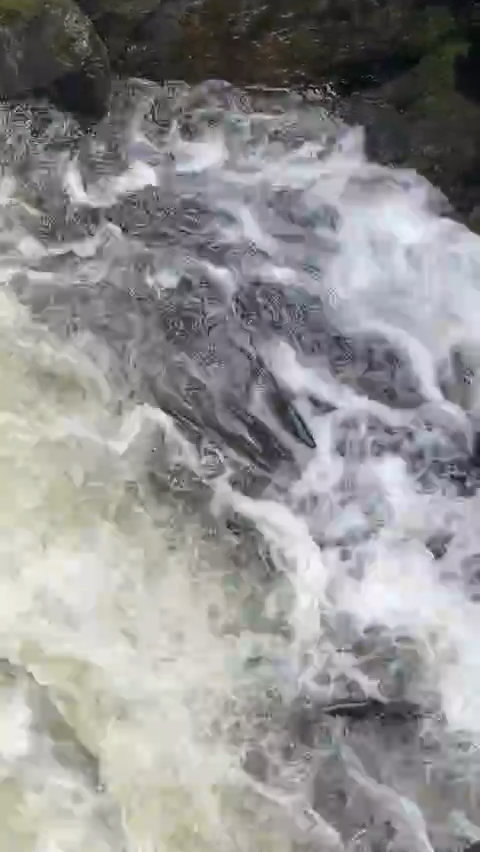Torres: Awe-inspiring sight left me wondering about our own survival
I just got back from a cruise to Alaska, where we stopped at Ketchikan, Juneau, Skagway and finally Victoria, Canada.
I've travelled extensively but I've experienced nothing like Alaska. The rugged landscape, the breathtaking mountains, untouched wilderness and wildlife left me often without words. But it was during an excursion in Ketchikan, where our tour bus broke down and we had to exit, that I witnessed something I never thought I would.
The site of thousands of salmon fighting incredibly fast currents and rocky terrain in order to reach the site where they were spawned was a thing of beauty and endurance. It was majestic to behold. It was inspiring.
Inch by inch, the salmon ― King salmon and Coho (silver) salmon — were desperately trying to make it back to the very spot where they hatched years earlier before they ventured out of Alaska's fresh water to live several years in the Pacific Ocean. Now, they were flinging themselves up and over rocks, resting with hundreds of others to regain their strength before continuing to fight against the current and other obstacles in order to make it to the next rock and another chance at rest.
They have already stopped eating and the males begin changing color and shape.

All this is done to lay or fertilize eggs, knowing the journey will take all of their energy. They eventually languish and die, providing food for bears and other critters or simply adding nutrients to the stream they just traversed.
Scientists have come to believe the fish find their way "home" by using the earth’s magnetic field like a compass. Other studies suggest they use smell to find their way back to the very same stream they traversed years earlier.
Seeing the salmon hurl themselves high in the air and batter themselves against the rocks and the current was something I'll remember for the rest of my life.
But it also made me extremely sad.
No, not sad for the salmon. Well, OK, maybe a little sad for them. It made me sad because if we, as human beings, had to endure such hardship, danger, starvation and death simply to keep our species going, I fear we would have gone extinct a long time ago.
Let's face it, we wouldn't go through all that. Thank God we don't have to.
We can't even get on the same page regarding face masks or vaccinations or books that should be allowed in schools or how to clean up our lagoon. We disagree, argue and get nasty about almost everything. Don't believe me? Just take a look at social media. God forbid someone post something that goes against the mob-like mentality.
No, we would never work so hard to keep our species going.
Forget the species, it's bad enough that many of us ― myself included ― have to fight every inclination to stay on that recliner watching television just to get in a paltry bit of exercise to keep ourselves alive. We don't care enough about our own health, let alone humankind.
More from Torres: Torres: There was no way I was going to jinx seeing my play on the big stage
Abramowski evidence sent to FDLE for testing gives him hope after 21 years | Torres
One might argue that we are the opposite of salmon. We spend our lives destroying the planet we live on. Remember how clean the oceans were during the pandemic when we shut down and stopped killing the planet for a bit? The normally cloudy (polluted) waters of the Venice canals cleared enough for people to see fish again. Remember the residents of the Indian city Jalandhar, waking up one morning in stunned disbelief as they saw the Himalayan mountains for the first time because the lockdown caused a drop in air pollution?
No, we'd never struggle as mightily as salmon to ensure future generations. I hate to think that animals are nobler than we are. Maybe we are capable of such heroic acts but just don't show it. As the engagement editor in charge of the opinion page, one of my tasks is not just to gripe about stuff but to offer solutions as well.
I'm sorry I don't have any to offer except this suggestion: Maybe we start taking a moment each day to admire something about our fellow humans ― preferably from other cultures, religions, political beliefs ― that we find is worth struggling for. Maybe that's our salmon run.
Contact Torres at jtorres@floridatoday.com. You can follow him on Twitter @johnalbertorres or on Facebook at facebook.com/FTjohntorres.
Support local journalism and become a subscriber. Visit floridatoday.com/subscribe
This article originally appeared on Florida Today: We are lucky not to work as hard as salmon to ensure species survival
